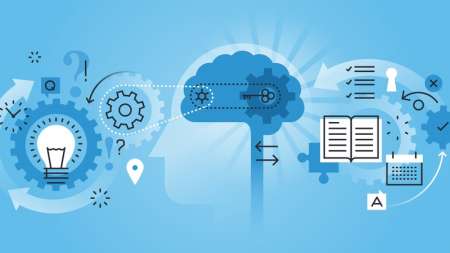A new technology stack is offering government agencies a way to accelerate and simplify their AI data pipelines in the hybrid, multi-cloud environment. […]
Experts say the cybersecurity problem is too vast and complex to be solved by traditional approaches alone. Artificial intelligence (AI) can offer a lifeline to organizations overwhelmed by massive volumes of information technology (IT) and OT data as they try to stay ahead of the next big threat. MeriTalk recently sat down with two cybersecurity and AI experts at NVIDIA – Bartley Richardson, director of cybersecurity engineering, and David Reber, the company’s chief security officer, to discuss how AI can help solve the thorniest cybersecurity challenges. […]
High-performance sensor architectures are allowing for faster data processing as more data continues to become available and requires processing for analysis and artificial intelligence applications, officials from NVIDIA and Lockheed Martin said on March 24 at the NVIDIA GTC Conference. […]
Splunk’s cybersecurity and Security Orchestration, Automation, and Response (SOAR) suite can be combined with NVIDIA Morpheus running on Hewlett Packard Enterprise’s (HPE) Edgeline GPU-accelerated converged edge platform to provide AI-enabled real-time monitoring and remediation of an edge network, all while saving analysts and data scientists time. […]
As use of artificial intelligence (AI) increases across the public and private sector, companies like Lockheed Martin are using AI advancements to further missions and to even collaborate with NVIDIA to address wildfires. […]
On today’s episode of MeriTalking, MeriTalk’s Nicole Burdette sits down with Jay Boisseau, AI & HPC Technology Strategist at Dell Technologies, and Marc Hamilton, Vice President of Solutions Architecture and Engineering at NVIDIA, to explore the steps agencies are taking toward “digital first government” and what this means from a workforce, cybersecurity, and emerging technology perspective. […]
Over the past 20 years, government agencies have worked to shift from paper-based to digital operations. Early efforts, too often, went halfway. Agencies digitized the front end, but back-end operations largely remained the same. And on the front end, a digital customer experience was not as robust as it was in person. For example, early-stage digital government offered citizens access to forms online, which was convenient. But if someone had a question, there was no mechanism for in-person follow-up or an immediate response. […]
Federal IT leaders want to see their agencies achieve enterprise-wide artificial intelligence (AI) proficiency in the next three to four years, according to a recent survey from MeriTalk underwritten by Dell Technologies and NVIDIA, “From Pilots to Proficiency: Operationalizing Federal AI.” […]
While most Federal agencies are at least dipping toes into the artificial intelligence (AI) pool, new MeriTalk research finds some are struggling to incorporate the technology more broadly into operations. […]
Federal agencies are increasingly turning to artificial intelligence (AI) for advanced technology solutions, but face challenges operationalizing AI on larger scales at the agency level. […]
Back in March, the Federal government pivoted to telework practically overnight and since then, Federal IT experts have been on the hunt for ways to improve the employee experience, maximize productivity, and strengthen remote environment security. […]
Six months into a highly successful make-or-break campaign to put the Federal government workforce on a remote-work footing to deal with the coronavirus pandemic, the hard-won experience of that battle has paved the way for renewed action on broader IT modernization, government and private sector officials said on a recent MeriTalk webinar. […]
MeriTalk recently sat down with Chip Carr, Senior Manager of Virtual GPU Technology at NVIDIA to discuss how Federal agencies have transitioned to telework environments while introducing new technologies, applications and collaboration tools – and what Carr sees going forward. […]
The Federal government took important steps forward with artificial intelligence (AI) technology policy in 2019 with the AI Executive Order, the DoD AI strategy, and the OPEN Government Act. With that said, however, weaving AI into our Federal DNA means integrating with (often aging) agency infrastructure and rethinking how we solve problems and deliver services. […]
Alex Measure, senior economist at the Labor Department’s Bureau of Labor Statistics (BLS)–who has developed and deployed an artificial intelligence application to help the agency analyze workforce health data–said on Tuesday that convincing agency leaders to pursue AI applications can be the toughest part of the development and deployment journey. […]
Federal agency officials said on Tuesday that internal work to develop artificial intelligence (AI) technologies is picking up, but also cautioned that the still-experimental nature of those efforts makes it difficult to predict when products and services will emerge from them. […]
As the Federal government looks to emerging technologies such as artificial intelligence (AI) to help improve citizen services and lower government costs, applications that enable this new computer-based intelligence via application programming interfaces (APIs) might be the least disruptive and inexpensive way for agencies to get started. […]
An official with data storage technologies provider Pure Storage told MeriTalk that issues holding back Federal government adoption of artificial intelligence (AI) technologies include the high cost of super-computing resources and the continued reliance of government agencies on legacy IT systems that were not created with AI applications in mind. […]
Gary Newgaard is a giant in the government IT industry. For those of you who don’t know him, I’m not just saying that–I’m six feet tall and standing next to Gary makes me feel like I should join the lollipop league. […]
Artificial intelligence is sexy–no doubt about it. From self-driving cars to personal assistant technology that can anticipate your every need, the future of AI looks promising. However, the actual technology can be confusing. And rarely does the reality of AI match up to expectations created by Hollywood portrayals. […]


















